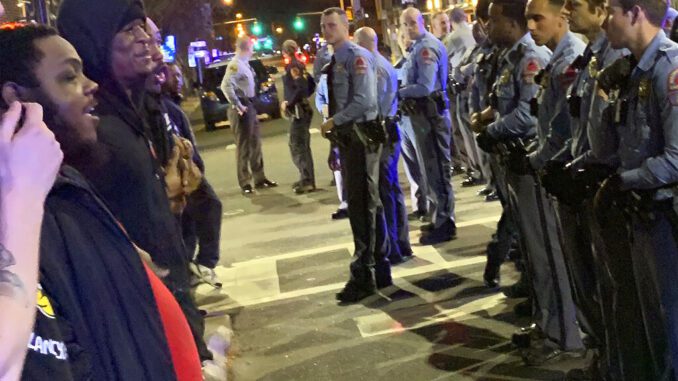
RALEIGH — State Rep. Allen McNeill (R-Randolph) filed House Bill 775, “Fund Law Enforcement/Detention/Corrections,” in early May to help turn around law enforcement recruitment problems by offering $5,000 signing bonuses for new officers willing to sign a three-year contract with agencies in the state.
“It’s meant to be more of a recruiting tool,” McNeil told NSJ in a phone interview. “I guess you could call it an anti-Defund the Police bill. It was predicated on the fact that it’s getting more difficult to recruit officers into the law enforcement profession.”
McNeill said there are a lot of reasons people aren’t choosing law enforcement as a career path. One reason is they used to recruit heavily among those returning from military service overseas, but he said there are not as many available veterans as there were in the past. But a bigger reason, he says, is recent negative attention on the profession, which has taken away a lot of the sense of honor and prestige that came with the job.
McNeill is himself a 32-year veteran of law enforcement who “did a bit of everything” during his career. He worked in the prisons, worked patrol, ran the vice unit and then finished his career as the Randolph County Sheriff’s Office chief deputy.
“I felt like I was making a difference in people’s lives, helping solve crime,” he said of his early years on the job.
But now, he says his former colleagues in law enforcement are reporting a dip in morale. This is also being seen in the numbers, which he says show a shortage of around 2,000 officers in the prison system and alarming shortages everywhere from big-city police departments to rural sheriff’s offices to the state Highway Patrol.
“Now is not a great time to be in law enforcement, because of all the issues that are going on,” McNeill said. “Everything — pay, the stigma, the national ‘Defund the Police’ movement, a lot of people saying the police are racists, there’s systemic racism — it’s just a discouragement for anyone that might want to make law enforcement a career.”
He said, while there are bad actors in any profession, he believed they were getting a “bad rap” on the degree to which these problems exist across communities, and that he wished “citizens would trust people in law enforcement to weed those out. And I think we do a good job of weeding those out.”
The bill was given a first reading in the House and then sent to the Budget Committee. With McNeil chairing the Justice and Public Safety Subcommittee, he will be able to guide some of the discussions around funding of law enforcement, saying, “It’s nice to have a seat at the table.”
As a stand-alone bill, he said it likely wouldn’t move forward, but it would probably be wrapped up into the overall budget. The Senate will take first action on the budget this session and then will negotiate with the House on their separate priorities. He said they were also waiting for updated revenue projections and a finance package agreement with the Senate to see what kind of money they may have to devote to things like signing bonuses.
For McNeill, he said it would be “one of their top priorities to do a step-pay plan for prisons,” since they are having a particularly hard time getting enough officers in detention centers.
“A prison or a county jail, it’s a tough assignment,” he said. “You get the comments [from prisoners] and sometimes the assaults. So it’s a job that’s just not cut out for everybody. In the North Carolina prison system, they hire a lot of officers, and they don’t last that long. They get in there, and it’s just not what they thought.”
McNeill said for most people, there is no amount of money you could pay them to do a job like that, and the people willing to do it aren’t getting offered enough to make it worthwhile.
“As time progresses, I only see that getting worse,” he said. “It’s widespread across the whole law enforcement field.”
In terms of support, he’s had a lot of calls from people in the state’s Department of Public Safety, who want him to extend the program to probation officers. He’s also heard tentatively from the N.C. Sheriff’s Association that they’d be behind offering these kinds of incentives, adding, “but I don’t have anything in writing yet.”
For McNeill, it comes down to the fact that “somebody is going to be in control of the neighborhood.” And the recent spikes in homicide rates, in his view, “directly go back to criminal gangs trying to control certain areas of a city or a community” in a time when law enforcement is seeing low morale and fewer people signing up to replace those leaving.




